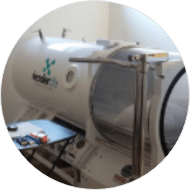Outstanding Cancer Treatment Results

Why Choose New Hope for Alternative Cancer Treatments
 Advanced Cancer Treatments
Advanced Cancer Treatments Top-Rated Physicians
Top-Rated Physicians Personal Care
Personal Care Patient Satisfaction
Patient SatisfactionWhat Is Pancreatic Cancer?
Pancreatic cancer is a disease in which malignant cells develop in the tissues of the pancreas. The pancreas is a gland positioned behind the stomach and in front of the spine. It is responsible for producing digestive juices and hormones that regulate blood sugar. Specifically, cells called exocrine pancreas cells produce the digestive juices, while cells termed endocrine pancreas cells generate the hormones. Pancreatic cancer begins when cells in your pancreas develop mutations in their DNA. These mutations prompt cells to grow uncontrollably and to continue living even after normal cells deteriorate and die. These accumulating cells can produce tumors and may spread to other parts of the body through the blood and lymph systems. Most pancreatic cancer cases start in the cells that line the ducts of the pancreas.Types of Pancreatic Cancer
Pancreatic Exocrine Tumors
About 94% of pancreatic cancers are classified as exocrine tumors. These tumors start in the exocrine cells — including sweat, salivary, mammary, ceruminous, lacrimal, sebaceous, and mucous — of the pancreas. Adenocarcinoma is the most common type of pancreatic cancer, and treatment for these tumors is based on the stage of growth.Pancreatic Endocrine Tumors
These tumors are far less common and are most often benign (noncancerous). Though rare, cancer originating from a pancreatic endocrine tumor (PET) affects the hormone-producing cells, which manufacture and release insulin and glucagon into the bloodstream. These tumors are also termed islet cell tumors or neuroendocrine tumors.Warning Signs or Symptoms
Having one or more of the symptoms below does not automatically mean you have pancreatic cancer. In fact, some of these symptoms are more likely to be caused by other health conditions. However, if you have any of these symptoms, it is wise to have them checked by a doctor for proper diagnosis and treatment, if needed. The symptoms of exocrine pancreatic cancers and endocrine pancreatic tumors often differ from one another. Thus, they are described separately.Signs and Symptoms of Exocrine Pancreatic Cancer
- Jaundice and related symptoms (dark urine, light-colored or greasy stool, and itchy skin)
- Abdomen or back pain
- Nausea and vomiting
- Blood clots
- Weight loss and poor appetite
- Gallbladder or liver enlargement
- Diabetes
Signs and Symptoms of Pancreatic Neuroendocrine Tumors (NETs)
- Gastrinomas
- Glucagonomas
- Insulinomas
- Somatostatinomas
- Vasoactive Intestinal Peptide Releasing Tumor (VIPomas)
- Pancreatic Polypeptide or PPoma
- Carcinoid tumors

How to Prevent Pancreatic Cancer
Today, there is still no known cause of pancreatic cancer, meaning there are no definite ways to thwart the disease. But what you can do to keep it at bay is to minimize the risk factors you can control. Here are some ways:Avoid smoking
Smoking increases your risk of developing not only pancreatic cancer but various other life-threatening diseases. Talk to your doctor about tactics to help you stop, including medications, support groups, and nicotine replacement therapy. If you don’t smoke, don’t start.Maintain a healthy weight
If you have a healthy weight, maintain it. If you need to lose weight, strive to lose one or two pounds (0.5 or 1 kilogram) a week, which may seem slow, but steady and healthy nonetheless.Choose a healthy diet
Combine regular exercise with a diet rich in fruits, vegetables, and whole grains to help you lose weight. A diet rich in colorful produce and whole grains may also help reduce your risk of varying cancers.Reduce alcohol use
Heavy alcohol intake has long been tied to pancreatic cancer in many studies. Though the link is still uncertain, drinking too much alcohol can lead to conditions such as cirrhosis and chronic pancreatitis, both of which increase pancreatic cancer risk.Limit exposure to certain chemicals
Avoiding workplace exposure to chemicals that may reduce your risk for pancreatic cancer, including benzene, pesticides, certain dyes, and petrochemicals (petroleum and natural gas).How to Prevent Pancreatic Cancer:
New Hope Medical Cancer Diagnostic ProcessMedical examination
Your medical records and family health history are crucial for determining pancreatic cancer risk. A physical exam is also necessary, followed by laboratory tests to determine whether you have internal signs of the disease.CT Scan
Computerized tomography is an imaging test that produces intricate and detailed images of the interior parts of the body, including the pancreas.Ultrasound
Using high-frequency sound waves, ultrasound produces images of the different organs and body parts to detect abnormalities.Biopsy
A surgeon commonly performs a biopsy. It works by removing a tissue sample from the body, which helps discover the presence, cause, or extent of cancer.Magnetic Resonance Imaging (MRI)
MRI is another type of imaging test that generates detailed images of the different parts of the body using radio waves.Positron Emission Tomography (PET) Scan
This nuclear medicine functional imaging technique is used to examine metabolic processes in the body as an aid to diagnose diseases.How the New Hope Medical Center Treats Pancreatic Cancer
Our pancreatic cancer treatment programs may include, but are not limited to:
Anti-Tumor Intravenous Therapy
IV therapy allows a high dose of vitamins, minerals, and antioxidants to enter the bloodstream without passing through the digestive tract.Dendritic Cell Therapy
Since the 1990s, dendritic cells are clinically used as cellular mediators for the therapeutic vaccination of patients with cancer and advanced diseases.Advanced Immunotherapy
Advanced immunotherapy boosts the body’s natural ability to combat cancer by restoring immune system function.Ozone Therapy
Ozone therapy is used to sterilize and treat conditions by disinfecting the area around them, improving the body’s absorption and use of oxygen, and stimulating the immune system.Hyperbaric Oxygen Therapy
Your body needs a sufficient supply of oxygen to function. Hyperbaric oxygen therapy is a well-established treatment that involves breathing pure oxygen in a pressurized tube or room.Ultraviolet Blood Irradiation Therapy (UBI)
UBI is a method that exposes the blood to light, which heightens the body’s immune response to eliminate infections.Far Infrared Therapy
Far infrared enhances circulation in the skin, eases pains, modulates sleep, protects against oxidative stress, and reduces inflammation.Nutritional Guidance and Lectures
Proper nutrition is essential to good health and is absolutely essential for a fully-functional and disease-combating body.Autologous Immunogen Therapy (AIT)
The feasibility and immunogenicity of an autologous AT-2-inactivated DC vaccine have been shown to support its potential use for therapeutic immunization of chronically infected individuals, including cancer patients.Facilities
At New Hope Unlimited, we pride ourselves in providing superior comfort, cleanliness, and cancer care at our 8,000 square foot medical treatment center in San Luis Rio Colorado, Mexico. We worked with renowned architects and contractors to create the ideal space for recovery, which includes state-of-the-art lounge areas and spacious private in-rooms that assure the comfort of our patients and their loved ones. To make our patients feel right at home, each private ward is equipped with high-definition U.S. television, quality bedding, and high-speed internet connection. And with proper nutrition playing a vital role in cancer recovery, New Hope Unlimited also fulfills the dietary needs of each patient using fresh, organic produce to prepare breakfasts, lunches, snacks, and dinners. Comfort and cleanliness are also strictly implemented in our medical treatment rooms, which are equipped with the latest technology and equipment to provide the highest standard of care and treatment. Our medical center also has an in-house Hyperbaric Chamber, a well-established therapy for decompression sickness, exclusively available for our patients’ use. Further, New Hope Unlimited has maintained its exceptional partnership with Hospital Migoo, a medical group comprised of certified physicians and specialists that are committed to our patients’ comfort and well-being.Alternative Medicine Misconceptions
Several misconceptions surround complementary and alternative medicine (CAM), especially since more and more cancer patients are turning to alternative medicine, including those who have difficulty meeting the cost of conventional care. Some inaccurate information about CAM include: Alternative Medicine is Only an Alternative Many alternative medicine practitioners are also medical doctors, chiropractors, or other trained medical specialists. Many of these professionals work closely with MDs to coordinate care. To reap the full benefits of your cancer treatments, remember to always inform your health care providers about all therapies received from every practitioner you work with. Alternative Medicine Doctors Never Use Conventional Medicine A credible natural doctor will never tell a cancer patient to replace prescribed medication without the consent of the original doctor. In most cases, the MD and alternative medicine practitioner are the same person. If not, they will coordinate a treatment approach that benefits the general health or well-being of the patient. Alternative Medicine Does Not Work Licensed health care providers will not recommend natural therapies without conducting in-depth research. They will consider scientific investigations and personal experiences to suggest protocols that work. Multiple studies have, for instance, confirmed that acupuncture is an effective treatment for various medical conditions. Also, appropriate dietary changes are perceived to promote good health and even reduce or treat some diseases, among several other alternative therapies backed up by scientific studies.Pancreatic Cancer Fact or Fiction
Fact
Early detection is keySome people delay getting checked in fear of what the doctor might find. However, early detection of pancreatic cancer significantly increases the chances for successful treatment. In fact, five-year survival rates are highest among people who are diagnosed early. There are two components of early detection of cancer: screening and education to promote early diagnosis.
Pancreatic cancer is more prevalent in developed countries
Developed countries in Europe and North America exhibit higher incidences of pancreatic cancers. The Czech Republic ranks first in both the incidences and mortalities related to pancreatic cancer. Other locations with the highest rate of pancreatic cancer in the world include Slovakia, Armenia, Hungary, Slovenia, Finland, Japan, Denmark, Austria, Latvia, Malta, French Guiana, and the Republic of Moldova.
Fiction
Pancreatic cancer is always fatalThe truth is, pancreatic cancer is not always deadly. As mentioned, early detection is the ultimate key to successful treatment. Also, advances in pancreatic cancer therapies have made the disease less challenging to treat than it was in the past. If you are concerned about developing pancreatic cancer — don’t be! It is a rare form of cancer, occurring in roughly 30,000 people a year.
Pancreatic cancer screening tests are widely available
Unfortunately, researchers have not yet developed a one-step and accurate system to screen for pancreatic cancer. Unlike prostate or breast cancers, for instance, there is no blood test or specific imaging procedure that can detect this cancer. CT scans can identify prostate tumors, but only a biopsy can determine if those tumors are carcinogenic.
How to Cope with a Pancreatic Cancer Diagnosis
Cancer not only affects your physical health, but it can also cause feelings of negativity such as anger, loneliness, fear, and distress. If you are struggling to cope with your pancreatic cancer diagnosis, here are a few ideas to help you manage stress and have more control over your disease:
Discover New HobbiesHobbies are a way to take your mind off the stresses of life. You can enjoy movies and television shows, listen to music, meditate, or even indulge in something as simple as spending time with friends and family.
Be as Active as You CanWhen exercising, your brain releases chemicals that make you happy. As long as your doctor approves, you can do light physical activities like walking, swimming, or stretching.
Express Your FeelingsBottling your feelings can develop new anxieties, and it’s hard for any person to handle cancer all alone. You can try reaching out to trusted friends and relatives or express your feelings through writing or painting.
Focus on What You Can ControlStaying organized and busy can help you stop worrying about your disease. Being involved in your healthcare, keeping track of your appointments, and changing your lifestyle are among the things that can give you a sense of control.
Look for the PositiveAlthough challenging, try to look for the good in the bad, or try to be hopeful instead of thinking the worst. Focusing your energy on negative possibilities will not only bring your spirit down, but also the hopes of those who love you.
Learn Everything About Your Cancer and TreatmentLearning as much information about your disease and treatment options can alleviate fear and anxiety. At New Hope Unlimited, we take the time to address each patient’s questions, qualms, and worries regarding cancer and alternative medicine.
FAQs
1. What are the functions of the pancreas?The pancreas produces hormones such as insulin and glucagon. These hormones help the body use or store the energy derived from food. The pancreas also makes pancreatic juices containing enzymes that aid food digestion.
2. What are the risk factors for pancreatic cancer?
Your risk of developing pancreatic cancer increases with age. The average time of diagnosis is 71 years old. Other contributing factors may include gender, race, family history, smoking habit, chemical exposure, as well as obesity, diabetes, liver cirrhosis, and stomach disorders.
3. Can I live without my pancreas?
Yes, you can live without your pancreas. However, you will have diabetes, meaning you will need to take insulin regularly. Your doctor will also require you to take enzyme pills, which helps digest food.
4. Why is pancreatic cancer usually found in later stages?In most cases, symptoms manifest once pancreatic cancer has already spread to other parts of the body. About 50 percent of pancreatic cancers will not be classified until they have already metastasized, which is why it is crucial to make regular appointments with your doctor.
5. Can pancreatitis be a precursor for pancreatic cancer?
Yes, it can be. But most cases of pancreatitis are unrelated to pancreatic cancer.




